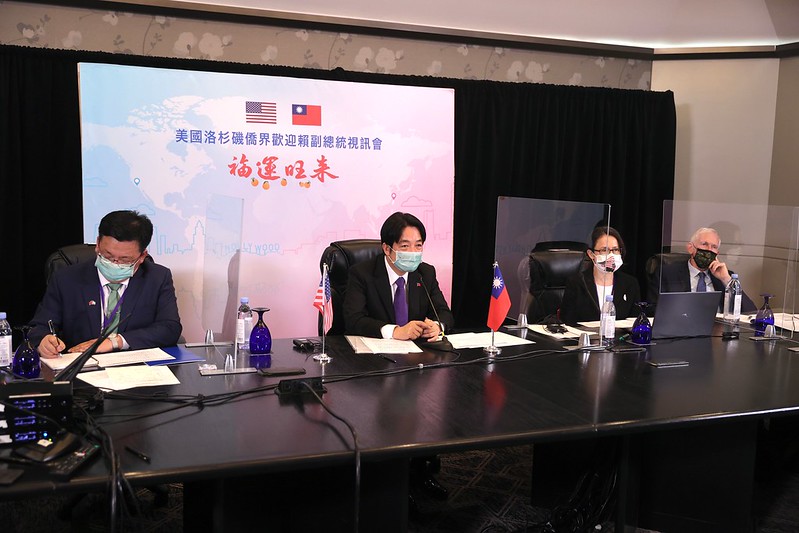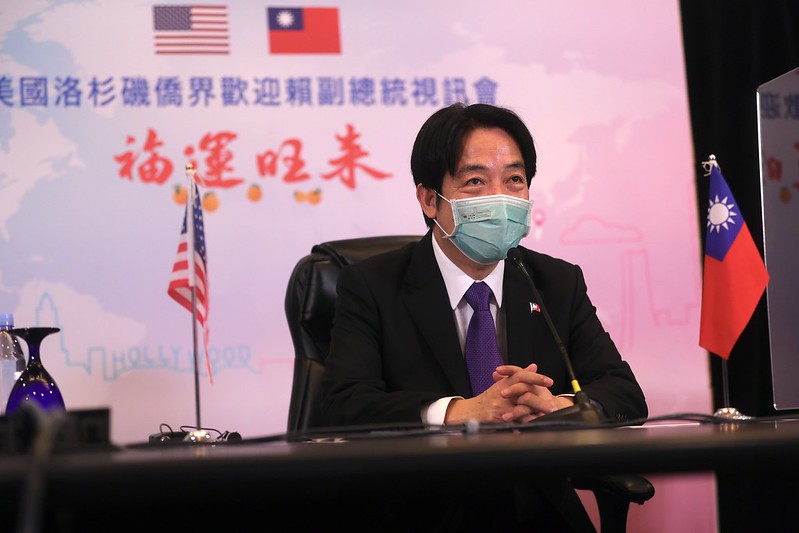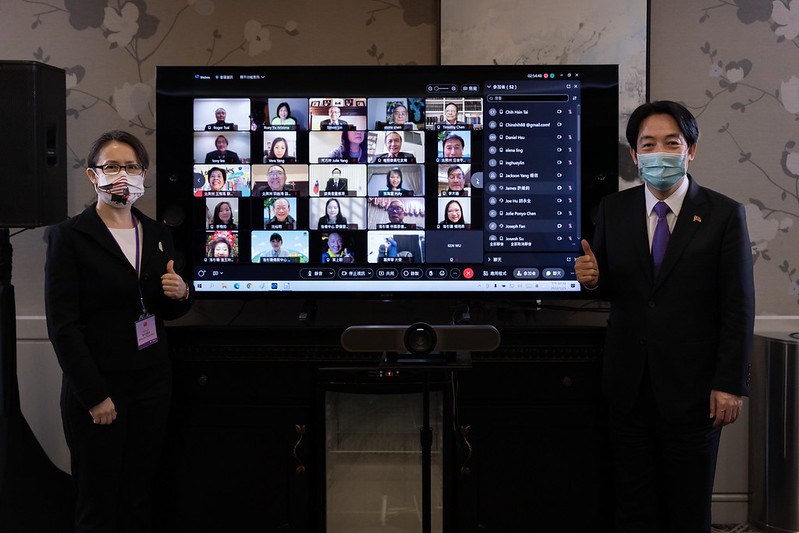News & activities
 News releases
News releases
On the evening of January 25 (morning of January 26 Taipei time), Vice President Lai Ching-te attended a videoconference hosted by members of Taiwan's overseas community in Los Angeles to welcome him on a stopover on his trip to Honduras. In remarks during the meeting, the vice president highlighted Taiwan's successes in disease prevention and economic development, and emphasized that Taiwan will work to overcome setbacks in order to further improve our nation and show the international community that we are an active force for good in the world.
In his remarks, the vice president explained that on this visit, he is traveling to Honduras as special envoy of President Tsai Ing-wen to attend the inauguration of the Central American country's first woman President, Xiomara Castro, and that he had specifically arranged to transit through the US as part of the itinerary. The vice president thanked the US government as well as the Ministry of Foreign Affairs for their work to make his stopover safe, smooth, and enjoyable, and added that he had also used the stopover as an opportunity to exchange views with members of US Congress on issues related to Taiwan, cross-strait relations, and Asia more broadly.
Vice President Lai thanked the members of the overseas community in Los Angeles for coming to his hotel to welcome him, and lamented that he would be unable to shake hands with or embrace his friends on this trip because of the pandemic. The vice president mentioned that there had been a relatively small-scale dinner with overseas community members originally planned for the trip, but that because the spread of the pandemic in the US, he had decided to forego the dinner in line with the priority of disease prevention and out of a desire to avoid any oversight that might bring COVID-19 back into Taiwan. The vice president expressed hope that there would nevertheless be many future opportunities for more extensive exchanges, both in Taiwan and in the US.
The vice president explained that on his trip to the Republic of Honduras, the president had given him a three-part mission – to strengthen Taiwan-Honduras ties, bilateral cooperation, and Taiwan's broader international participation – and had also instructed him to express thanks to the leaders and members of Taiwan's overseas community, including for their campaign launched in the early stages of the pandemic to donate face masks and other protective equipment. He added that members of US Congress with whom he had spoken prior to the event had also mentioned this campaign, and said he was deeply proud of the positive impact that our overseas community has had on American society.
Vice President Lai mentioned that he had brought spring couplets, red envelopes, and commemorative coins as gifts, and would also present overseas community members with special hanging decorations as tokens of gratitude from Taiwan.
On the subject of the COVID-19 pandemic in Taiwan, Vice President Lai pointed out that under President Tsai's leadership, government agencies have worked together effectively, medical personnel have served bravely on the front lines of our response, and the Taiwanese people have cooperated with our government's disease prevention policies. To address the spread of the highly infectious Omicron variant of COVID-19, relevant government agencies have made an all-out effort to promote our national vaccination program, under which, to date, more than 80 percent of Taiwanese have received at least one vaccine shot, and more than 70 percent have received at least two shots. Going forward, our government will continue working to increase third-dose coverage in order to protect the health of our people.
The vice president cited members of Taiwan's medical community and public health experts in saying that though the Omicron variant is highly infectious, it has a lower morbidity rate, which has prompted considerations of how to adjust disease prevention policy, as well as an awareness that we will inevitably start to move toward coexistence with the virus. He emphasized, however, that the process would need to be conducted with all due care, and that disease prevention policy would be slowly adjusted so as to preserve social stability, prevent panic, and avoid endangering the health and welfare of our people. The vice president summarized the government's approach, saying that it will develop and implement a comprehensive policy that ensures that neither Taiwan's people, society, nor economy will be affected by the transmissibility of the Omicron variant.
The vice president said that the international community has become aware of Taiwan's strength in public health and our national unity because of our successful response to the pandemic as well as the solid industrial and commercial foundation that we have laid over the past few decades. He noted that the world saw how the creativity and technical prowess of the Taiwanese people allowed us to swiftly make up for shortages in global production capacity, and that Taiwan's economic growth rate for 2020 reached 3.11 percent, the highest among the Four Asian Tigers. In addition, the vice president pointed out that Taiwan has experienced 17 consecutive months of positive growth in export orders, which, together with these other achievements, is the result of everyone's hard work, and shows that containing the pandemic has also stabilized our economy.
Vice President Lai also recalled his earlier discussion with members of US Congress, who all praised Taiwan's staunch commitment to democracy, and were also aware of the frequent incursions made by Chinese military aircraft into Taiwan's Air Defense Identification Zone (ADIZ) as well as Beijing's many disinformation campaigns and attempts to divide Taiwanese society. The vice president reaffirmed Taiwan's commitment to democracy and refusal to bow to authoritarianism, and noted that the US is not the only country to firmly support Taiwan, as Taiwan is now seen as a reasonable, united, cooperative, and progressive country on the international stage. He said that democracy is in Taiwan's DNA, and that the unanimous support for Taiwan in both the Democratic and Republican parties is also key to our global image.
Vice President Lai emphasized that, going forward, Taiwan will face many challenges, such as reaching our goal of net-zero emissions by 2050, restructuring industrial supply chains in the wake of the pandemic, realizing the structural transformation of our economy, and navigating a changing geopolitical landscape, all of which require us to be united and which, at the same time, provide our country with opportunities for revitalization.
The vice president said that, after decades of hard work and dedication, our transformation from an aid recipient to a country that offers external assistance highlights our responsibility to help others. Throughout the COVID-19 pandemic, our overseas community has provided funds and personnel to help fight the pandemic in their local communities, and Taiwan has donated masks to countries in need. Vice President Lai said that we will view setbacks as sources of encouragement in order to further improve our nation and show the international community that Taiwan is a global force for good, and encouraged everyone to work together toward this vision.
The vice president concluded by saying that the image of 40 overseas community leaders on his screen was both impressive and heartwarming as a symbol of how Taiwan has had a positive impact on places across the world. He wished everyone taking part in this meeting good health and a happy Year of the Tiger.











